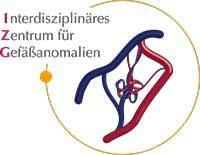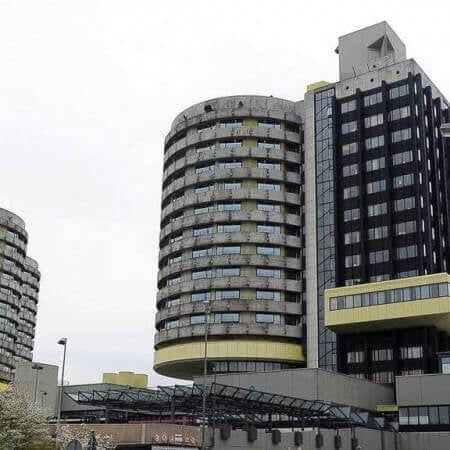Stomach Cancer — Embolization or Chemoembolization: treatment in the Best Hospitals in the World
Treatment prices are regulated by national law of the corresponding countries, but can also include additional hospital coefficients. In order to receive the individual cost calculation, please send us the request and medical records.
Stomach Cancer Treatment
- Stomach (gastric) cancer
- Diagnosis and conservative treatment with 1 course of chemotherapy
- Surgical partial resection of the stomach
- Surgical complete resection of the stomach and further plasty of intestinal tissue
- CRS and HIPEC - hyperthermic Intraperitoneal chemoperfusion
- Therapy with Lutetium-177-DOTATATE (Lu-177)
- Embolization or chemoembolization
- Chemotherapy

Department of Interventional Radiology
The Department of Interventional Radiology offers the full range of imaging examinations, as well as innovative image-guided minimally invasive techniques for the treatment of tumors, vascular diseases and internal pathologies (for example, CT, MRI, PET-CT, SPECT). The department's doctors have deep knowledge and colossal experience in the field of interventional radiological methods of treatment, which represent an excellent alternative to open surgical interventions. Despite the high level of technical equipment and the presence of advanced computerized systems, the focus is always on the person with his individual needs. Compliance with current clinical protocols and high professionalism of the department's specialists contribute to the successful clinical practice, as well as the reputability of the department among the best medical facilities of this kind in Germany.




Department of Interventional Radiology and Neuroradiology
The Department of Interventional Radiology and Neuroradiology offers a full range of advanced imaging diagnostics and minimally invasive treatments on both an inpatient and outpatient basis. The department has state-of-the-art medical equipment for imaging tests such as X-ray, computed tomography, magnetic resonance imaging, digital subtraction angiography, and mammography. The medical facility also performs many highly effective interventional therapeutic procedures under image guidance, which in many cases allow patients to avoid traumatic open surgery. For example, the department successfully performs local fibrinolysis, thrombectomy, percutaneous transluminal angioplasty, hemostasis, transarterial chemoembolization, uterine artery embolization, and other procedures. The department's neuroradiologists specialize in brain and spinal cord imaging and the treatment of central nervous system disorders. Interventional neuroradiology focuses on the treatment of carotid artery stenosis, brain aneurysms, arteriovenous malformations, dural fistulas, subdural hematomas, brain tumors, skull base and spinal tumors, and chronic back pain. The department's medical team has extensive clinical experience in their areas of expertise. The specialists are guided by the recommendations of the German Society for Interventional Radiology and Minimally Invasive Therapy (DeGIR) and the German Society for Neuroradiology (DGNR), which helps to achieve the best results.






Department of Adult and Pediatric Diagnostic, Interventional Radiology, Neuroradiology
The Department of Adult and Pediatric Diagnostic, Interventional Radiology, Neuroradiology is one of the best institutions of its kind in Germany and offers patients the full range of radiological studies and imaging-guided minimally invasive therapy. The department’s scope of tasks also includes imaging diagnostics in children of all age groups, detection and invasive treatment of cerebral vascular pathology (neuroradiology). Patient care is provided both on an inpatient and outpatient basis.






Stomach cancer is a common and very aggressive malignant tumor. In 65% of cases, it is detected at 3-4 stages. The main treatment method is surgery. European doctors use chemoembolization in some patients. It can be applied prior to surgery to remove a tumor or as an option for palliative treatment in patients with advanced cancer. With the help of embolization, doctors can suppress the primary tumor, its metastases in the liver and stop severe gastrointestinal bleeding.
Content
- What are embolization and chemoembolization?
- In what cases can chemoembolization be used for gastric cancer?
- Chemoembolization before surgery
- How is chemoembolization performed?
- Chemoembolization without surgery
- Chemoembolization for liver metastases
- Why is it worth undergoing embolization abroad?
- Treatment in Europe with Booking Health at an affordable price
What are embolization and chemoembolization?
Embolization is a treatment method for stomach cancer via obstructing (closing the lumen) of the vessels, which feed the tumor. The tissues do not receive enough oxygen, so they die off.
Embolization is often combined with regional chemotherapy. In this case, the procedure is called chemoembolization. Microspheres saturated with chemotherapy drugs (drug-eluting microspheres) or a lipiodol solution containing cytostatics are used for it.
Embolization can reduce the tumor size and stop hemorrhage. It is used as a preparation for an operation to remove the stomach, and in case of refusal of surgical intervention – as one of the main methods of local control of the tumor. In addition to chemoembolization, the treatment usually includes other methods: irradiation, chemotherapy, targeted therapy, immunotherapy.
Embolization has the following benefits:
- Method is safe for health, it rarely causes complications with the proper procedure performance.
- Minimal trauma rate – the doctor closes the vascular lumen with a catheter, through a small incision in the leg or arm.
- No need for long-term rehabilitation.
- Good tolerance of treatment – some gastric cancer patients develop postembolization syndrome, but its manifestations disappear after 2-3 days and can be successfully eliminated with drugs.
- Compatibility with any other cancer treatments.
Regional chemotherapy as one of the elements of the chemoembolization procedure has an advantage in efficiency over standard systemic chemotherapy. Doctors can administer significantly higher drug concentrations to the tumor through the arterial network than those they use during intravenous injection. At the same time, systemic side effects develop less often, since cytostatics are absorbed by cancer cells.
In what cases can chemoembolization be used for gastric cancer?
Embolization for gastric cancer is mainly used in the following three cases:
- Preparation for surgery.
- Suppression of liver metastases.
- Palliative care for reducing the tumor size and stopping bleeding.
Embolization and chemoembolization are not considered the main treatments for gastric cancer. In most cases, doctors use surgery, irradiation, and systemic drug therapy.
Few hospitals use embolization. This is a technically complex procedure in gastric cancer, which can be performed only if the doctor can determine the sources of the blood supply to the tumor. For this purpose, angiography is used: contrast is injected into the vessels, then a series of X-ray images are made to assess the distribution of the contrast medium.
The following types of embolization for the treatment of gastric cancer can be applied:
Chemoembolization with drug-eluting microspheres. The doctor injects microspheres of different diameters into the arteries to block large vessels and their small branches. Within a few weeks, chemotherapy drugs are released from them, which continue to affect the tumor. Microspheres are suitable for palliative care of patients. They stop hemorrhage and inhibit the development of cancer.
Oily chemoembolization. The procedure involves the injection of a chemo-oil suspension – a solution of lipiodol with chemotherapy. The procedure causes temporary blockage of the arteries. It is often used prior to surgery for tumor removal.
Coil embolization. It is also possible to use a hemostatic sponge in alcohol or other materials, which close the lumen of the vessels. The technique is used to stop bleeding. In advanced stages of cancer, this is a palliative procedure used to deal with complications. In addition, the method is applied before the operation. It is usually combined with oily chemoembolization in the treatment of patients who suffer from gastric bleeding.
Chemoembolization before surgery
The main treatment method for stomach cancer is surgery. Neoadjuvant therapy is prescribed to some cancer patients with gastric tumors prior to surgery. One of the options is embolization involving the treatment by closing the lumen of the vessels supplying the tumor.
The procedure can be performed with the following goals:
- Tumor reduction before surgical removal.
- Reduced blood loss during surgery. Large vessels supplying the tumor are closed. This means they will not bleed much. The patient will lose less blood and feel better after the surgery. The need for hemotransfusion (blood transfusion) decreases.
- Achievement of tumor resectability. Some patients are not candidates for surgery at the time of diagnosis. However, after the successful completion of chemoembolization, the tumor decreases in size, which allows the doctor to perform a radical surgery and give the patient a chance to cure a deadly disease.
- Reduced volume of the operation. In case of stomach cancer, the doctor can remove the entire organ or its part. Partial resection is always preferable if it allows for achieving the same oncological results, since after stomach resection the patient's quality of life is higher as compared to gastrectomy. As a result of chemoembolization, the tumor regresses, and therefore the doctor can perform organ-preserving surgery.
- Reduced risk of local recurrence. Recurrences are less common after combined treatment for gastric cancer than after surgery alone.
How is chemoembolization performed?
Although chemoembolization can be beneficial for many gastric cancer patients, not everyone can have it. Only patients who have a great (large) arterial vessel supplying the tumor are candidates for this procedure. If the tumor is supplied by a large number of small arteries, embolization cannot be performed.
Prior to the procedure, angiography is performed: upper mesentericography, celiacography and gastric arteriography. The doctor examines the state of blood vessels in the stomach, liver and pancreas.
If it is possible to detect a vessel supplying the tumor, the doctor inserts a catheter into it. This could be:
- Left gastric artery – if cancer is located in the lesser curvature of the stomach.
- Branches of the gastroduodenal artery – if the cancer is located in the lower third of the stomach.
- Right gastric or gastroepiploic artery – if cancer is located in the area of the greater curvature of the stomach.
Sometimes the tumor reaches a large size and occupies almost the entire stomach. Different types of embolization are used for patients with such neoplasms: the doctor can close the lumen of only the largest vessel from which the tumor receives most of the blood, or perform chemoembolization of several arteries at once.
The task of doctors is not only to successfully close the vessels supplying the cancer. It is also important to avoid embolization of non-target vessels supplying blood to healthy organs and tissues. The doctor accurately assesses the structure of the arterial network in the stomach area before performing a therapeutic manipulation. If necessary, he uses a redistribution technique – he closes the non-target vessels with a balloon catheter to prevent penetration of the embolization agent into them.
After the procedure, the tumor quickly decreases in size by 20-35%. After 1-2 weeks, the doctor performs a surgical intervention to partially or totally remove the stomach.
Chemoembolization without surgery
With unresectable cancer, chemoembolization is used as a palliative procedure.
The main goal of this treatment is to stop hemorrhage. Severe bleeding complicates the course of stomach cancer in 20-30% of cases. As a rule, it can be stopped by the endoscopic technique: the doctor inserts the endoscope into the stomach and "cauterizes" the bleeding vessel.
Sometimes it is not possible to stop hemorrhages in this way or they become too frequent. In this case, the best treatment option is embolization. It can be performed even emergently, due to ongoing bleeding. The doctor closes the lumen of the vessels with spirals or in another way.
In case of advanced cancer, embolization is often performed without regional chemotherapy. In other cases, the procedure is performed in the form of chemoembolization. In this case, it allows the doctors to restrain tumor growth, reduces the risk of complications, increases the patient's life expectancy and improves its quality.
Chemoembolization for liver metastases
With gastric cancer, many patients develop liver metastases at the advanced stage. In most cases, they are unresectable – they cannot be removed with surgery. In this case, chemoembolization becomes the main way to combat cancer metastases.
The procedure involves closure of the branches of the hepatic artery, which supply the metastatic tumor. Microspheres are most commonly used in Europe. They are saturated with chemotherapy drugs, which are released within several weeks.
Metastatic cancer treatment is safe for health and minimally traumatic. The healthy parenchyma of the liver is mainly supplied from the portal vein, so it is minimally damaged when the lumen of the branches of the hepatic artery is closed. At the same time, the tumor is mainly supplied by the arterial blood, therefore, after vascular embolization its size decreases several times.
Why is it worth undergoing embolization abroad?
Only a few hospitals perform vascular embolization for gastric cancer. There are even fewer hospitals, which perform this procedure with good results. It is possible that embolization is not yet used in your country for this disease, but even if it is used in your home country, in European hospitals you will get the best results with minimal health risks.
There are several reasons for you to undergo gastric arterial embolization abroad:
- Doctors perform superselective chemoembolization of the arteries, which supply stomach cancer. Microcatheters can be used, if necessary. Closing small vessels located as close to the tumor as possible minimizes the risk of side effects and complications resulting from insufficient blood supply to healthy tissues.
- Doctors accurately assess the state of blood flow, detect and protect non-target vessels from the embolization.
- Various types of embolization can be used for gastric cancer: European doctors use microspheres, oily chemoembolization, and spiral embolization. Depending on the purpose of the procedure, the best option is selected for each patient.
- Doctors abroad can use embolization at any stage of stomach cancer, from the early one to the advanced. It can be used both before surgery and for palliative treatment of inoperable patients.
- Doctors can perform a single-stage embolization of the vessels supplying the primary tumor in the stomach and metastatic tumors in the liver.
- Successful combination of embolization of the stomach vessels with other methods of cancer treatment: surgery, irradiation, systemic drug therapy.
Treatment in Europe with Booking Health at an affordable price
To undergo treatment in one of the European hospitals, please use the services of Booking Health. On our website, you can see the cost of treatment in different hospitals, compare prices and book a medical care program at an affordable price. The cost of embolization or chemoembolization for stomach cancer is between 24,420 EUR and 41,370 EUR. Arterial embolization in European hospitals will be easier and faster for you, and the cost of treatment will be lower.
Please leave your request on our website. Our employee will contact you and provide consultation about the treatment in Europe. Booking Health will take care of the organization of your trip. We will provide the following benefits for you:
- We will select a hospital for treatment in Europe, whose doctors specialize in gastric arterial embolization for cancer patients.
- We will help you overcome the language barrier, establish communication with your attending physician.
- We will reduce the waiting period for the medical care program and book a doctor's appointment on the most suitable dates.
- We will reduce the price. The cost of treatment in European hospitals will be decreased due to the lack of additional coefficients for foreign patients.
- We will take care of all organizational issues: documents for entering the country, transfer from the airport, hotel, interpreting services, etc.
- We will prepare a medical care program and translate medical records. You do not have to undergo previously performed diagnostic procedures.
- We will provide communication with the hospital after treatment in Europe.
- We will organize additional examinations and treatments in European hospitals, if necessary.
- We will buy medicines abroad and forward them to your native country.
- We will help you keep in touch with the hospital and the doctor after treatment in Europe.
You will receive treatment from the best doctors in the world. The Booking Health specialists will help reduce the cost of treatment and take care of all organizational issues, and you will only have to focus on restoring your health.
Authors: Dr. Nadezhda Ivanisova, Dr. Sergey Pashchenko

